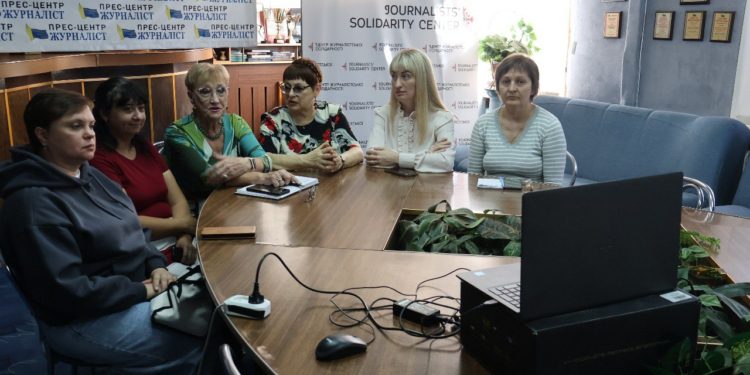The present and future of local newspapers, as well as the quality and relevance of the content of printed local media publications of three regions – Zaporizhzhia, Odesa, and Mykolayiv – were discussed by the participants of the online meeting of editors. The event, organized and held by the Zaporizhzhia Journalists’ Solidarity Center (JSC), brought together media executives who have resumed their output thanks to the help of the NUJU and the support of the JSCs operating in Ukraine under the auspices of UNESCO.
The online meeting was attended by the NUJU President, Sergiy Tomilenko, the heads of the Zaporizhzhia and Odesa regional organizations of the NUJU, Honored Journalists of Ukraine Nataliya Kuzmenko and Yurii Rabotin, editors of local newspapers of the Zaporizhzhia Region Svitlana Karpenko (Trudova Slava, Orikhiv), Tetiana Velyka (Holos Huliaipillia, the town of Huliaipole), Kateryna Zavarzina (Nashe Zhyttia, the village of Novomykolayivka), Oleksandra Kot (Dniprovski Vohni, the town of Vilniansk), Nataliya Stina (Chervonyi Promin, Zaporizhzhia District), Vyacheslav Tverdokhlib, a journalist of the Mariupol-7 TV channel, who is currently working in Zaporizhzhia.
The Mykolayiv and Odesa Regions were represented by newspaper editors Olena Ivashko (Vechirnii Mykolayiv, Mykolayiv), Petro Rybin, (Lyman, Tarabunary), Svitlana Ovcharenko (Vpered, Bakhmut – a newspaper from the Donetsk Region, which has relocated and is currently working in Odesa), as well as a member of the Odesa Regional Council, Oleksiy Kobylnikov.
“The revival of front-line newspapers and support for local printed publications is one of the priorities of the Union. And life every day confirms that this is the right priority,” emphasized Sergiy Tomilenko.
During the meeting, everything was important – both reflections on the demand for the printed word in wartime, especially where information does not reach in other ways, and stories about the topics of publications and the preparation of materials – essays and photo reports. Colleagues shared professional secrets and doubts and consulted on how best to solve this or that problem.
These are just a few messages that were heard during the online meeting and which eloquently and accurately define the content of the professional conversation, its level, and relevance.
“If it were not for the National Union of Journalists of Ukraine, we would not have survived. The NUJU has shown itself to be a powerful and effective organization in this war,” all participants in the meeting were unanimous in this conclusion.
At the same time, both they and the President of NUJU, Sergiy Tomilenko, noted another important point: the NUJU, with the help of foreign partners, supported local front-line media at the start of the recovery and continues to support, but these funds are not enough. Therefore, the newsrooms solve the issue of financial support in various ways. And they also openly shared this experience with colleagues.
All newsrooms work persistently and systematically with grants, and from time to time, they manage to win them, look for advertising, and attract benefactors. Often, journalists work for free because the main thing is that the newspaper is published to bring people truthful information that will give them strength and confidence in victory. Journalists themselves have experienced a lot of grief and loss in this war. But what keeps them going and helps them find strength is their dedication to the profession, solidarity with colleagues, and the awareness of the fact that journalists are important.
Call the Zaporizhzhia JSC at 096 277 5352 (Nataliya Kuzmenko and Valentyna Manzhura, the Zaporizhzhia JSC coordinators). The Center is located at 152 Sobornyi Avenue.
ABOUT JSC
The Journalists’ Solidarity Centers is an initiative of the NUJU implemented with the support of the International and European Federations of Journalists and UNESCO. The initiative is designated to help media representatives working in Ukraine during the war. The Centers operate in Kyiv, Lviv, Ivano-Frankivsk, Chernivtsi, Zaporizhzhia, and Dnipro and provide journalists with organizational, technical, legal, psychological, and other types of assistance.
ABOUT UNESCO
UNESCO is the United Nations Educational, Scientific, and Cultural Organization. It contributes to peace and security by promoting international cooperation in education, sciences, culture, communication, and information. UNESCO promotes knowledge sharing and the free flow of ideas to accelerate mutual understanding. It is the coordinator of the UN Action Plan on the Safety of Journalists and the Issue of Impunity, which aims to create a free and safe environment for journalists and media workers, thus strengthening peace, democracy, and sustainable development worldwide. UNESCO is working closely with its partner organizations in Ukraine to provide support to journalists on the ground.
The designations employed and the presentation of material throughout this digest do not imply the expression of any opinion whatsoever on the part of UNESCO concerning the legal status of any country, territory, city, or area or its authorities or concerning the delimitation of its frontiers or boundaries.
The authors are responsible for the choice and the presentation of the facts contained in this digest and for the opinions expressed therein, which are not necessarily those of UNESCO and do not commit to the organization.
Valentyna Bystrova
Photo by Dariya Zyrianova

 THE NATIONAL UNION OF
JOURNALISTS OF UKRAINE
THE NATIONAL UNION OF
JOURNALISTS OF UKRAINE
















Discussion about this post